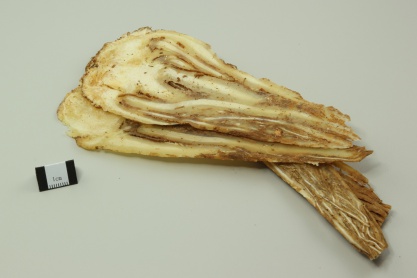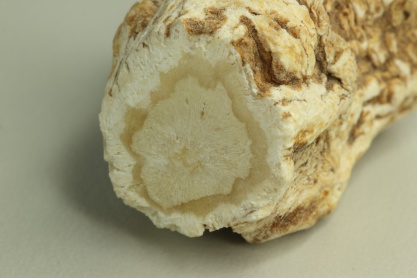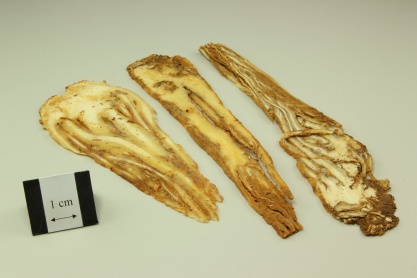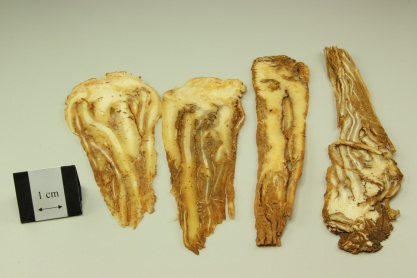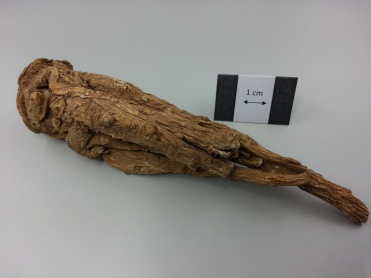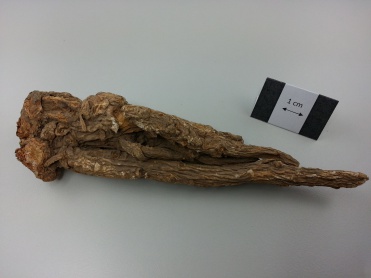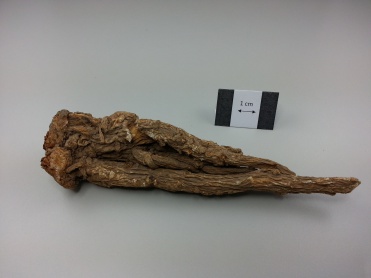當歸
- ENG
- Chinese Angelica
- LATIN
- Angelicae Sinensis Radix
| Medicinal Group | Blood-tonifying medicinal |
|---|---|
| Source | Dried root of Angelica sinensis (Oliv.) Diels (Fam. Umbelliferae) |
| Nature and Flavors | pungent, sweet; warm |
| Meridian Affinity | Liver, Heart, Spleen |
| Actions | To tonify and activate blood, regulate menstruation, relieve pain, moisten the intestines and relax bowels |
Family
Umbelliferae
Part used
Root and Rhizome
Indications
Anemia with dizziness and palpitation; menstrual irregularities, amenorrhea, dysmenorrhea; constipation; rheumatic arthralgia; traumatic injuries; carbuncles, boils and sores
Research Findings
- Based on recent animal studies and clinical trials, roots of Angelica sinensis has been used in the treatment of gynecologic diseases, cardio-cerebrovascular disease, nervous system diseases, and nephrotic syndrome.[3]
- Astragalus membranaceus and Angelica sinensis may retard the progress of renal diseases. [4]
- Angelica sinensis injection can significantly inhibit platelet activation, relieve vascular endothelial cell injury, and improve microcirculation in ulcerative colitis.[5]
- Angelica Injection has evident therapeutic effect in treating acute cerebral infarction.[6]
- Twenty-five Percent of Angelica injection can improve pulmonary hemodynamics through influencing the metabolism of ET-1, AT-II and EDF as well as increase PaO2 of the body.[7]
- Astragalus and Angelica Mixture could improve the renal function of chronic kidney disease patients, elevate their plasma albumin levels, and ameliorate associated qi deficiency syndrome, blood deficiency syndrome, and yin deficiency syndrome, especially for chronic kidney disease patients of qi-blood deficiency syndrome. [8]
- Qingchang Huashi Recipe (includes parched Radix Angelicae sinensis) was effective and safe in treating active ulcerative colitis patients of inner-accumulation of damp-heat syndrome.[9]
- The effect of reducing serum gastrin level by Radix Angelicae Sinensis may improve portal hemodynamics and be beneficial for portal hypertensive gastroduodenal mucosal lesions in cirrhosis. [10]
- Qishen Huoxue Granules (include Radix Angelicae sinensis) shows favorable prospect in treating critical acute kidney injury patients.[11]
Cautions
No Data.
Report on adverse effect
Headaches may occur in sensitive individuals [1, 2]
Reference
Reference
- Hirata JD et al. Does Dong Quai have estrogenic effects in postmenopausal women? A double-blind, placebo-controlled trial. Fertility and Sterility, 1997, 68:981–986.
- Chang HM, But PPH, eds. Pharmacology and applications of Chinese materia medica. Vol. 1. Philadelphia, PA, World Scientific Publishing, 1986.
- Chen XP, Li W, Xiao XF, Zhang LL, Liu CX. (2013). Phytochemical and pharmacological studies on Radix Angelica sinensis. Chin J Nat Med. , 11(6):577-87. doi: 10.1016/S1875-5364(13)60067-9.
- Song JY, Meng LQ, Li XM. (2008). Therapeutic application and prospect of Astragalus membranaceus and Angelica sinensis in treating renal microvascular lesions. Zhongguo Zhong Xi Yi Jie He Za Zhi. , 28(9):859-61.
- Dong WG, Liu SP, Zhu HH, Luo HS, Yu JP. (2004). Abnormal function of platelets and role of angelica sinensis in patients with ulcerative colitis. World J Gastroenterol. , 15;10(4):606-9.
- Liu YM, Zhang JJ, Jiang J. (2004). Observation on clinical effect of Angelica injection in treating acute cerebral infarction. Zhongguo Zhong Xi Yi Jie He Za Zhi. , 24(3):205-8.
- Xu J1, Li G. (2000). Observation on short-term effects of Angelica injection on chronic obstructive pulmonary disease patients with pulmonary hypertension. Zhongguo Zhong Xi Yi Jie He Za Zhi. , 20(3):187-9.
- Li S, Yin XX, Su T, Cao C, Li X, Rao XR, Li X. (2014). Therapeutic effect of Astragalus and Angelica mixture on the renal function and TCM syndrome factors in treating stage 3 and 4 chronic kidney disease patients. Zhongguo Zhong Xi Yi Jie He Za Zhi. , 34(7):780-5.
- He HH, Shen H, Zheng K. (2012). Observation of the curative effect of qingchang huashi recipe for treating active ulcerative colitis of inner-accumulation of damp-heat syndrome. Zhongguo Zhong Xi Yi Jie He Za Zhi. , 32(12):1598-6.
- Huang ZP, Liang KH. (1994). Effect of radix Angelicae sinensis on serum gastrin levels in patients with cirrhosis. Zhonghua Nei Ke Za Zhi. , 33(6):373-5.
- Yu YB, Zhuang HZ, Liu C. (2010). Effect of Qishen Huoxue Granule for auxiliary treatment of critical cases of acute kidney injury. Zhongguo Zhong Xi Yi Jie He Za Zhi. , 30(8):819-22.


